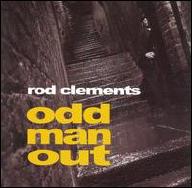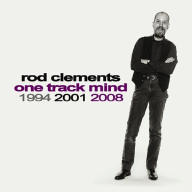Those rock instrumentals, in turn, led him to the bass -- as he explained in an interview with Tom Cunningham that appears on Clements' own web page, he was always fascinated by the single-string melodies of many of those instrumentals such as the Shadows' F.B.I., which often tended toward the bass strings on the guitar. He also became much more comfortable with and intrigued by the bass parts of the songs played by the various bands with which he sat in, and discovered that his childhood knack for harmonizing transferred very well to his playing on the four-string instrument. Faced with an immediate future as a relatively undistinguished guitar player or a potentially talented bassist, he chose the latter.
There was also a certain consistency in his preferences -- he played in bands with vocalists, of course, but he reserved his admiration for the likes of Bert Jansch, Davy Graham, and John Renbourn, instrumentalists all. Clements attended university at the insistence of his parents but he devoted most of his energy during those three years to music, and especially to a band initially called the Downtown Faction Blues Band, later shortened to Downtown Faction. Originally known as the Cyclones and then the Wombats, the group had something of a floating lineup -- Clements moved in and out of membership as his time allowed -- Ray Laidlaw, Ray Jackson, and Clements' longtime friend Simon Cowe passed through as well. The group evolved into the Brethren, with Clements, Jackson, Cowe, Laidlaw, and Jeff Sadler. During this same period, Clements took up the violin, inspired in part by Fairport Convention and the album Liege Lief -- this fit in perfectly with the Brethren's switch from blues to folk music.
It was at a gig at a folk club that the band crossed paths with Alan Hull, a guitarist/singer, who joined up soon after and replaced Sadler on guitar. The group changed its name to Lindisfarne -- which literally means "holy island" -- soon after. Hull and Clements dominated the band's songwriting, Hull writing most of the original numbers and generating the hits Lady Eleanor and Fog on the Tyne, while Clements provided Meet Me on the Corner -- the latter often compared favorably to the classic songs of Bob Dylan -- and Road to Kingdom Come, among other songs. Even during this period, in which the bandmembers were presumably working well together, Clements worked on the occasional outside project, and he and Jackson both ended up playing on Fool's Mate, the debut solo album of guitarist Peter Hammill (who was signed to the same label, Charisma).
The group split up in 1973, amid internal acrimony and management pressures, with the core Downtown Faction originals Clements, Cowe, and Laidlaw going off to form Jack the Lad in partnership with Clements' old friend Billy Mitchell -- Clements only stayed for the group's self-titled debut album, contributing four songs in the process. Rather than attach himself to another group, Clements chose to try establishing himself as a freelance musician in his own right, and he played on some pretty impressive recordings during this period, including Ralph McTell's hit version of Streets of London. By 1978, however, Clements and the entire original lineup were back together in Lindisfarne, which began a highly successful second phase of its existence.
Clements lasted with his group into the start of the 21st century, along the way playing with such luminaries as Mark Knopfler, Michael Chapman, Bert Jansch, and briefly joining Jansch and co-founder Jacqui McShee in a latter-day lineup of the Pentangle. In 2000, Clements released his debut solo album, Stamping Ground, featuring a dozen original songs authored or co-authored by him, with veteran roots rocker Sid Griffin included among the musicians, on the Market Square label. He followed it up with One Track Mind on the Resurgent label, a year later. Thanks to his association with Lindisfarne, and Meet Me on the Corner and his other songs, he remains a much-loved music star in England, especially in the group's native Newcastle. ~ Bruce Eder, Rovi













